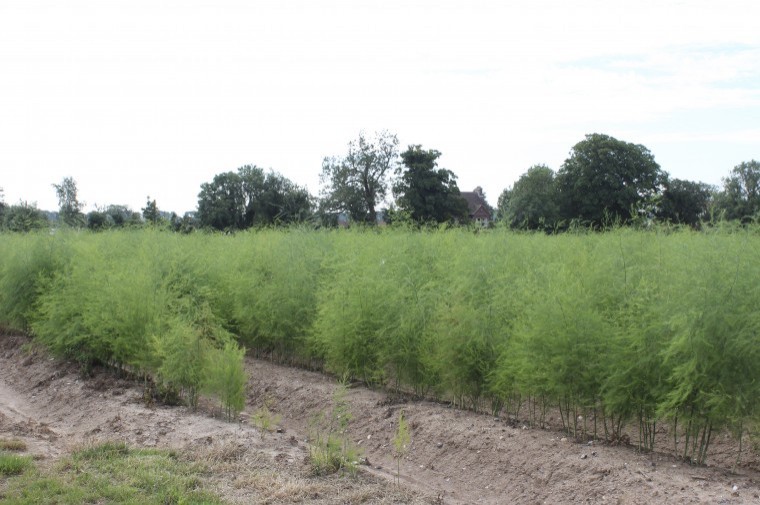Edward and Matthew Spanton currently manage 250 hectares of mainly arable land, with 55ha of asparagus on their family farm, Edward Spanton Farms, situated just outside Ramsgate, Kent.
Having planted their first asparagus in 2008, in 2014 the Spantons converted a grain store into a packing area, complete with automatic grader, giving them the capability to supply supermarkets such as Sainsbury’s.
This year, Wayborough Farm started the asparagus harvest at the end of March. “We cover around 2ha under small tunnels to give us a few week’s lead-in before the main crop comes on,” explained Matthew Spanton. “This year our first cut for the covered crop was on 31 March and uncovered harvest started on 3 April. We then had a cooler period which slowed things down a for a few weeks and for the majority of the season we experienced manageable flat line growth. Towards June, the temperatures reaching their late 20s meant the crop started to deteriorate so we finished cutting from 16 June.”
Speaking as the host grower at the biannual asparagus conference, organised by British Asparagus, Matthew Spanton confirmed his fears for the future of the sector. “Going forwards, our biggest concern, like most people, is our labour. It is getting harder to keep staff for short seasonal jobs; it really is key to look after them with good facilities and good pay because without this labour, there is no asparagus industry for us.”
Prospects for the availability for labour were revisited during the seminar section of the conference, with delegates gathering to hear from David Camp, chief executive of the Association of Labour Providers.
“Labour may rival the weather as the biggest challenge to growers in the future,” said Mr Camp. “We have high demand for labour but there is nearly full employment in the UK, with the lowest levels of unemployment since 1975.”
While Brexit has been a major factor, Mr Camp also highlighted that more is being done to raise standards of employment and ensure better wages in countries where seasonal workers have traditionally come from. “There are many countries throughout Europe who are in competition for the same sort of labour as we are, and yet we have had no new labour markets for many years now,” explained Mr Camp. “The current problem of labour is in danger of becoming a crisis if actions are not taken to clear the gaps in labour supply.”
Back in February 2017, the Association of Labour Providers surveyed all labour providers on their views for the coming year. 21% predicted that they would be unable to supply sufficient workers for the season and over 75% said that there would be insufficient or a lower quality of workers in 2017 compared to 2016. “The predictions from our survey have since become reality. According to an independent BBC report 18% of growers said they had fewer workers and 3% said they had many fewer workers,” said Mr Camp. “Labour shortages are the worst I have seen since before 2004.”
Offering advice to the asparagus industry, he urged growers to contact DEFRA with their experiences. “The seasonal agricultural workers scheme transition group will be meeting again in mid-September. Whatever evidence you can provide to demonstrate a shortage of labour on your farm and how this will affect your sector is very important. Take some time and put in the effort because the decisions on seasonal workers taken by the home office, will be taken based on DEFRA’s case which can only be built based on evidence.”
Exhibiting at the conference, Douglas Amesz, managing director of AG Recruitment, believes much can be done by individuals to alleviate some of the pressures. “Businesses and management teams can work on creating a community within the farm such that workers want to be here,” explained Mr Amesz. “Regaining our status as a preferred destination for seasonal workers is something that the industry is not talking enough about.
“We’re working far closer to our deadlines than ever before, and I think that next year is going to be even harder. It’s very clear that if we ignore these current trends we are going to significantly damage the British agricultural industry.”




